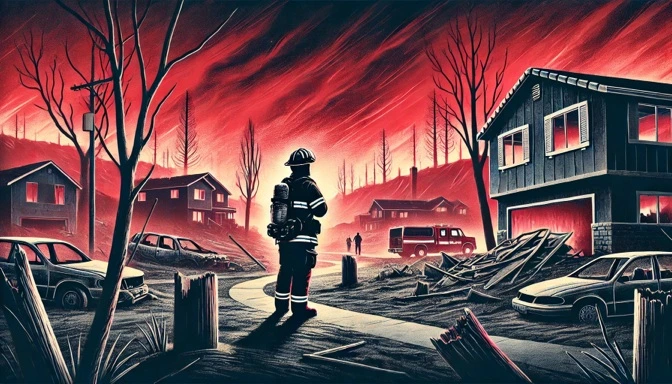By Kenneth Tiven
The inferno that swept through the upscale suburbs of Los Angeles is no Hollywood disaster movie. It’s a grim reality. The flames, fuelled by tinder-dry conditions and accelerated by climate-induced winds, have left a trail of destruction, claiming dozens of lives and reducing at least 12,000 homes and businesses to ashes.
Entire neighbourhoods now resemble war zones, their silence interrupted only by the crackling of embers and the hum of emergency vehicles. Toxic debris and water contamination further complicate the return for survivors, many of whom are grappling with the loss of a lifetime’s worth of memories.
A Personal Account of Devastation
Among those affected is a retired media executive, 93, who emailed this reporter from a hotel: “Evacuated yesterday with just the clothes on my back and Sally (my wife). Don’t know if we have a house. This is like Hiroshima. My God, the scope of it!”
For him and others, insurance offers little solace. It cannot replace the irreplaceable—artwork, books, and tokens of a lifetime. These are now nothing more than ash on a once-beautiful hillside in Pacific Palisades. A landscaper and his crew used pool water to spray walls and a tile roof to save the house of a family that was away. Going back to live in a surviving house amid the devastated neighbourhoods seems unsafe and unlikely.
The Wider Impact
The economic toll is staggering, with property losses nearing half a billion dollars. Yet the damage goes beyond dollars. The Federal Emergency Management Agency (FEMA) struggles to manage simultaneous disasters across the nation. In California, families face a dire housing crisis compounded by price gouging despite emergency restrictions.
Godwin Amafa, 69, lost his Altadena home of 25 years. “It’s like being lost in a fog,” he says, now living in a Pasadena hotel with his wife. Even at $140 a night, the rate feels “reasonable” amid the chaos.
Easily missed in this disaster are the people who worked in these upscale neighbourhoods, doing landscaping, maintenance, laundry, house cleaning, child care and other tasks. Their livelihoods are now gone and no insurance covers that. Mostly Latino immigrants, they are part of a devastated community that will take years to rebuild.
Political Fault Lines
The disaster has laid bare the deep divisions in America’s political landscape. California, a blue state with a Democratic governor, finds itself at odds with a federal government newly led by a resurgent Donald Trump. House Speaker Mike Johnson’s criticism of California’s fire response underscores the sharp political divide, with federal aid becoming a bargaining chip in budget negotiations.
Former basketball star Kareem Abdul-Jabbar aptly questioned: “Is a time of human misery the best time to throw dangerous and unproven accusations at political enemies?”
The Climate Crisis
While the debate over climate change rages on, the stark reality is undeniable: 2024 was the hottest year in recorded history, with apocalyptic consequences. Scientists, doctors, and experts warn of long-term health impacts akin to those faced by first responders after 9/11.
As one Los Angeles resident observed: “Half the country is thinking magically about things. We’ve allowed ourselves the luxury of being anti-everything—anti-science, anti-expertise.”
Reality is that fire-fighters are dealing with enormous areas still burning as weather predictions are adjusted daily. Forecasters are hopeful that changing wind direction will help firefighters. Hopeful is the operative word. With chaos comes the usual law enforcement warning of severe punishment for crimes, price gouging or scams targeting fire victims.
Rebuilding A Future
Reconstruction will require more than rebuilding homes. It demands a rethinking of infrastructure, fire suppression systems, and building materials. California’s housing shortage, already critical, is now a full-blown crisis.
Firefighters, including teams from Canada and Mexico, have worked tirelessly to contain the flames. Even prisoners from California’s penal system have joined the effort, risking their lives for $7 a day to earn time off their sentences.
Yet, as LA Fire Chief Kristin Crowley warns: “We are not in the clear yet. We must not let our guard down.” Crowley, a trailblazing leader, has faced baseless criticism from some political quarters, reflecting the toxic polarization of America’s discourse.
California’s inferno is more than a local tragedy; it’s a wake-up call to a nation grappling with climate change, political division, and the limits of human resilience. As the smoke clears, what remains is the enduring spirit of those who refuse to surrender, even in the face of overwhelming loss.
—The writer has worked in senior positions at The Washington Post, NBC, ABC and CNN and also consults for several Indian channels


